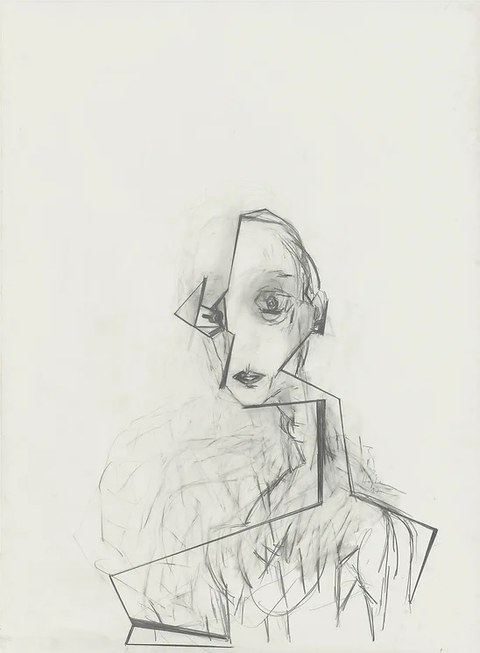Mar 25, 2024
Lecture series "Art in the GDR TODAY - Researching, Teaching, Preserving, Exhibiting"

Elke Hopfe_Porträt J. Ch._Kunstbesitz der Kustodie_TUD
The lecture series Art in the GDR TODAY brings together experts on East German art to discuss the current state of teaching, researching, preserving, and exhibiting art from the GDR. Both established academics who helped define the field before and after 1990 and a younger generation of scholars and curators will present their research perspectives on "Art in the GDR TODAY" every Tuesday at 6:30 pm starting on April 9 in the Görges Building on the TUD campus in Dresden.
The individual lectures will be supplemented by three panel discussions on "Teaching", "Preserving" and "Exhibiting", as well as artist talks with Johannes Heisig, Elke Hopfe and Doris Ziegler. This lecture series is intended for both the university community and a broad audience from Dresden and beyond.
Key questions to be discussed include: How is art from the GDR researched, taught, preserved and exhibited today in light of its often-contentious history of reception? How are its (art) historical context, its aesthetics and its significance being negotiated? How is this art being represented, preserved, and discussed in museums, archives and exhibitions? And what role do individual artists—their biographies and artworks—play in this?
Program
April 9, 2024
Panel discussion "Teaching Art from the GDR" with Sylvia Claus (Brandenburg University of Technology Cottbus-Senftenberg), April Eisman (Iowa State University/Fulbright Scholar TU Dresden), Karl-Siegbert Rehberg (TU Dresden), Kerstin Schankweiler (TU Dresden) Moderation: Gwendolin Kremer (TU Dresden)
April 16, 2024
Elke Neumann (Berlin)
“The International GDR – Historical and Contemporary Exhibition Projects”
April 23, 2024
Artist Elke Hopfe (Dresden) in conversation with Gwendolin Kremer (TU Dresden)
April 30, 2024
Christoph Tannert (Berlin)
“Was there an Artistic Subculture in the GDR?”
May 7, 2024
Anja Tack (Potsdam)
“On the Post-History of ‘GDR art.’ Art and Artists from the GDR since 1989/90”
May 14, 2024
Panel discussion “Preserving Art from the GDR” with Silke Wagler, Kunstfonds, Staatliche Kunstsammlungen Dresden (Dresden State Art Collections), Angelika Weißbach, Museum Utopie und Alltag, Kunstarchiv Beeskow, Lutz Wohlrab, Mail Artists Index, Berlin
Moderation: Gwendolin Kremer (TU Dresden)
May 28, 2024
Artist Doris Ziegler (Leipzig) in conversation with April Eisman (Iowa State University/Fulbright Scholar TU Dresden)
June 4, 2024
Paul Kaiser (Dresden)
“Simplicity vs. Diversity? Curatorial Concepts of East German Art between Renationalization and the Global”
June 11, 2024
Frank Eckhardt (Dresden)
“Transformation and Artistic Development. On the Impact of Social Upheaval on Artistic Work”
June 18, 2024
Artist Johannes Heisig (Teetz/Brandenburg) in conversation with April Eisman (Iowa State University/Fulbright Scholar TU Dresden)
June 25, 2024
Angela Lammert (Berlin)
“Alternative Narratives. Are ‘Black Paintings’ an eastern Invention?”
July 2, 2024
Panel discussion “Exhibiting Art from the GDR” with Thomas Bauer Friedrich (Kunstmuseum Moritzburg Halle/Saale), Ulrike Kremeier (Brandenburg State Museum of Modern Art (BLMK) Cottbus), Paola Malavassi (Das Minsk, Potsdam), Maike Steinkamp (Neue Nationalgalerie, Staatliche Museen zu Berlin), and Hilke Wagner (Albertinum, Staatliche Kunstsammlungen Dresden (Dresden State Art Collections))
Moderation: Gwendolin Kremer (TU Dresden)
July 9, 2024
Angelika Richter (Berlin)
“Women Artists and Performance Art in the GDR and Afterwards”
July 16, 2024
Alexia Pooth (Potsdam)
documenta and the GDR
In cooperation with the Hannah Arendt Institute for Totalitarianism Studies (Dresden).
At the same time as the lecture series, a group exhibition curated by students in art history entitled “Upheavals and Continuities. New Insights into Dresden Art around 1989/90“ will be on display in the Gallery of the Office for Academic Heritage, Scientific and Art Collections.
When: Tuesdays, 6:30 pm to 8:00 pm
Where: Lecture Hall 226 in the Görges Building, TU Dresden
The lecture series and supporting program were organized by Prof. Dr. April Eisman (Iowa State University/Fulbright Scholar TUD), Gwendolin Kremer (TUD) and Prof. Dr. Kerstin Schankweiler (TUD). Sponsors are the innovation group "Societal Change” of the School of Humanities and Social Sciences at TU Dresden and the Association of Friends and Sponsors of TU Dresden.
Contact:
Gwendolin Kremer
Office for Academic Heritage, Scientific and Art Collections of TU Dresden
+49 351 463 36405
+49 351 463 39461
